When Opposites Attract – INFPs and Compatibility with ENTJs and ESTJs
Opposites often attract, there’s no doubt about it! We are naturally attracted to people with strengths and abilities that balance out our weaknesses. I see this with the relationships I come across in the Myers-Briggs® world as well. I’ve talked to probably hundreds of INFJs in relationships with ESTPs or ISTPs and numerous INFPs with ENTJs or ESTJs. That’s what brings me to this post. I’ve received a request from an INFP to write a post about the INFP/ENTJ or ESTJ relationships. These types are true opposites in many ways; one leads with thinking and one leads with feeling. One is extroverted, one is introverted. You’d think they wouldn’t be very compatible just by looking at the letters in their types, but the truth is they often end up in relationships together.
Not sure what your personality type is? Take our new personality questionnaire here. Or you can take the official MBTI® here.
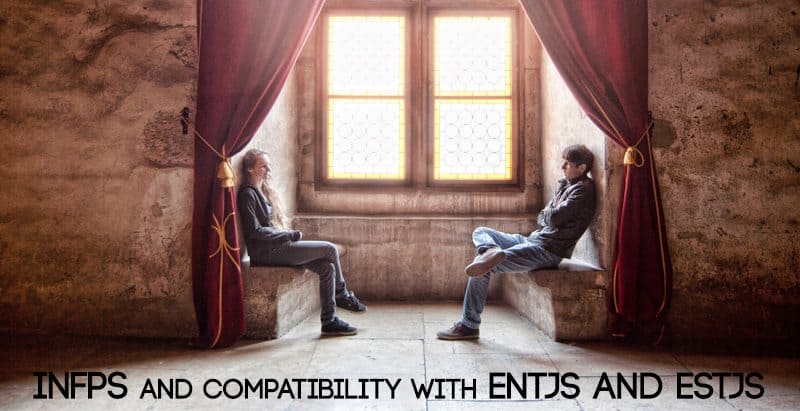
Table of contents
- Why Do Fi-Dominant Types End Up With Te-Dominant Types
- The Joys of the INFP/ENTJ Relationship:
- The Joys of the INFP/ESTJ Relationship:
- The Challenges of the INFP/ENTJ or ESTJ Relationship:
- Dominant Thinking with Dominant Feeling
- How to resolve this problem (for ETJs):
- How to resolve this problem (for INFPs):
- Different Values
- How to resolve this problem:
- Different Energy Needs
- Different Outward Decision-Making Styles
- The Sensing/Intuitive Difference in ESTJs and INFPs
- How to resolve this problem:
- What Do You Think?
Estimated reading time: 17 minutes
Why Do Fi-Dominant Types End Up With Te-Dominant Types
There’s a natural chemistry between two types that share a different order of the same functions. For example, INFPs and ENTJs share the same dominant and inferior functions but reversed. The INFP is dominant in Introverted Feeling and inferior in Extraverted Thinking, while the ENTJ is dominant in Extraverted Thinking and inferior in Introverted Feeling. Each of us has a natural interest and desire to advance our tertiary and inferior functions, so when we are paired with someone who is strong in the area we are weak in, we are naturally intrigued by them. The ENTJ will be drawn to the INFPs warmth and authenticity, and the INFP will be drawn to the ENTJs determination and intellectual prowess.
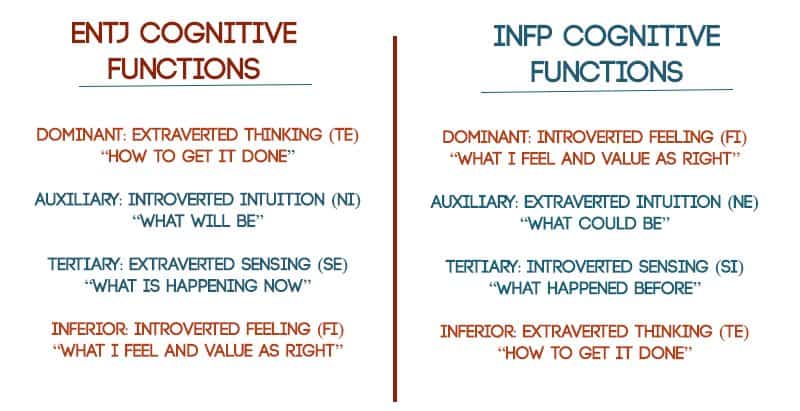
ESTJs and INFPs would seem like complete opposites at first glance. After all, they have no letters in common. Surprisingly, though, these two types tend to wind up in relationships a lot! When you look at their cognitive functions it’s not hard to see why. ESTJs and INFPs share the exact same four cognitive functions, but they are in a completely reversed order. You can see this in the graphic below:
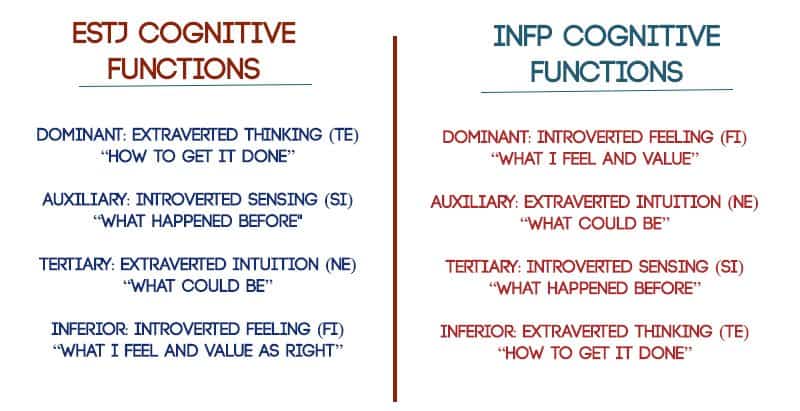
The Joys of the INFP/ENTJ Relationship:

INFPs and ENTJs share one common preference that makes communication lively from the beginning: Intuition. They both trust and perceive what they take in through patterns, impressions, and abstract conceptual ideas. They also are stimulated by theoretical conversation and talking about what things mean, and what could be in the future. They both are led by their inspirations; although the ENTJ is more single-minded in his focus (through Ni) and the INFP often has many inspirations (through Ne).
The things which make these two types different are also a source of interest and fascination. The INFP is often attracted to the ENTJs visionary, take-charge persona. The ENTJ is driven and focused on achieving their goals, and this single-minded determination and the efficiency that goes along with it is attractive and intriguing to the INFP. The INFP, in contrast, is driven by their values, morals, and concern for humanity. They are dreamers and idealists, who spend a lot of time in their minds (or in their books) considering how they can make a difference for humanity, or simply enjoying the imaginative process of their endless intuitive thoughts. The ENTJ is drawn to the INFP’s gentle nature, their amazing listening skills, and their creativity and numerous insights.
ENTJs and INFPs can get into long, drawn-out discussions about the purpose of life, the nature of the universe, or any other number of global concerns. Both ENTJs and INFPs eschew traditions and love to consider new and innovative ideas. The ENTJ can take the INFPs creative ideas and insights and give them a focused, strategic plan towards making it a reality. The INFP, in turn, can inspire the ENTJ to see many different ways of looking at the world and can inspire them with new angles they might never have thought of before.
INFPs are often attracted to the ENTJs intensity, ambition, confidence, and leadership capabilities. The driven nature and immense energy of the ENTJs vision is captivating to them and their ability to bring plans to reality makes them feel like they, too, can achieve their dreams.
ENTJs are often attracted to the INFPs warmth, sincerity, creativity, and insight into people. They find comfort in the INFP’s selfless nature and are amazed by their incredible listening skills. INFPs can help the ENTJ to calm down and get in touch with their vision and find new, creative ways to expand on that vision. ENTJs are focused on doing (Te) first, and envisioning (Ni) second, and the INFP can help them to see the vision alongside their task-oriented nature, giving them a more holistic focus.
ENTJs can help INFPs to get in touch with their inferior function, Extraverted Thinking, and become bolder and focused in their energies. They can help the INFPs ideas to spring forth into life, and not just simmer as ideas for eternity. INFPs can help the ENTJ to get in touch with their Introverted Feeling, and become more conscious of their values and own personal morals. They can help the ENTJ to understand the people part of the equation better, which can help them in interpersonal relationships when they start new careers or entrepreneurial endeavors.
The Joys of the INFP/ESTJ Relationship:

ESTJs and INFPs are often drawn to each other because they are so different from each other. The INFP is intrigued by the ESTJs practical, outspoken nature and the ESTJ is fascinated by the INFPS gentle, insightful demeanor. While these two types share zero preferences, they share all the same cognitive functions so they will simultaneously feel like opposites that “get” each other in a way that is baffling to them both.
ESTJs have strong personalities and exude confidence and a can-do attitude that can be a solace to the INFP. INFPs, who are so filled with ideas, yet have a harder time bringing them to fruition, can find a true partner and helpmate in the ESTJ. They also appreciate the ESTJs dependable nature, their down-to-earth mindset, and their ability to balance the INFP’s imagination with their own practical worldview.
INFPs have insightful, compassionate personalities. They are warm, gentle, and inquisitive and have an endless desire to improve the human condition. ESTJs find the authentic kindness of the INFP to be a comfort and encouragement. They are overwhelmed by the INFPs ability to care for them and provide a listening ear whenever it’s needed. When these two types are open-minded and mature, they can balance each other out in a way that is mind-blowing. They become two opposite sides of the same coin and can be unstoppable in their abilities to achieve goals and open each other’s eyes to new ideas and perspectives.
ESTJs can help their INFP partners to become more outspoken and take-charge. They can also help them to find practical ways to make their visions a reality. Because ESTJs share Introverted Sensing with INFPs, the two types can enjoy reminiscing about past experiences and creating memories to look back on in future years. INFPs often say that their ESTJ partners help them to become more organized, focused, and objective.
INFPs can help their ESTJ partners to be more self-aware and focused on the human aspect of their decisions. Where ESTJs can struggle with seeing everything in black and white, INFPs can reveal numerous shades and varieties that ESTJs may have never considered. They can help them to understand the complexity of the human spirit. This, in turn, helps the ESTJ to become more compassionate and understanding.
The Challenges of the INFP/ENTJ or ESTJ Relationship:
Dominant Thinking with Dominant Feeling

While there is natural chemistry and intensity to these relationships, there can also be fiery disagreements and conflicts. The biggest conflict that these two types face stems from their Thinking/Feeling difference. ENTJs and ESTJs are extremely direct, logical, and objective. They don’t like to beat around the bush or sugarcoat anything, and they can be extremely tactless in their delivery. Because ETJs have inferior Introverted Feeling, and absolutely no Extraverted Feeling (Fe) in their primary function stack, they can be completely unaware of the effect their words have on others. INFPs, in contrast, are very careful with their words and are extremely conscious of their effect. They are very sensitive and are prone to taking things personally, so the brash, direct nature of the ETJ can be unsettling to the INFP and cause them a great amount of distress. The ETJ can also feel that the INFP is overly sensitive and struggle with knowing how to communicate in a way that won’t offend.
When conflicts of the Thinking/Feeling nature arise, the two types react differently as well. The ETJ is likely to directly face the problem and try to find a resolution quickly. The INFP, in contrast, tends to withdraw when their feelings are hurt and try to avoid discussing what’s bothering them. They need time alone to work through their feelings and come to terms with their hurts. This can frustrate the ETJ who wants a rapid resolution and may struggle with patience waiting for the INFP to be ready to work things out.
The INFP, in turn, is somebody who will want to discuss the more emotional, value-oriented aspects of life, and this may not interest the ETJ and make them uncomfortable. We are all usually kind of uncomfortable trying to access our inferior function, and since the ETJs inferior function is feeling, they can feel out of their element trying to discuss the emotional matters of life. This can lead to the INFP feeling bored and restless over time and that they have nobody to truly connect with.
The ETJ is very focused on efficiency and has a knack for getting things done quickly and logically. The INFP has a more difficult time thinking objectively and struggles with taking things personally. Because the INFP’s inferior function is thinking, they struggle with finding the most logical decision or maintaining objectivity. The ETJ may feel like their impersonal analysis and focus on the facts is not appreciated by the INFP and can feel bewildered about how to move forward when they are worried about the INFP’s feelings, which can be very confusing to them.
How to resolve this problem (for ETJs):
– Give the INFP your full attention. Work at not interrupting, finishing their sentences, or rushing them along.
– Point out areas of harmony and agreement before mentioning disagreements and differences.
– When the INFP comes to you with a problem, don’t rush to fix it. Try to listen fully before suggesting a solution, and ask them if they want any help coming up with a solution first before even offering.
– Be careful not to speak harshly of other people, and express your feelings gently.
– Frequently let your partner know how much you care about them.
– Be sure to praise the INFP for their unique gifts; creativity, gentleness, warmth, whatever is unique to them. The INFP will know that you are very different from them, and some ETJs can make them feel inadequate by trying to push them to be more like themselves. Make sure they know that you appreciate them for who they are without alterations.
How to resolve this problem (for INFPs):
– Try not to take things personally when the ETJ is being tactless or says things very directly. It’s their natural strength to point out what they see as flaws. Remember that they can truly admire and respect people they critique or debate with, and it’s not a sign of ill will.
-Be up-front about your needs, including the need to be listened to without interruptions. ETJs like directness, and won’t be offended when you say exactly what you mean.
– Try to remain calm when expressing your feelings. This may be difficult, but the ETJ will understand what you have to say better and will often take it more seriously if you stay as calm as possible.
– If the ETJ says something that offends you, try to let them know quickly. If you need time to process things, let them know this as well. Try not to disappear without any warning as this will confuse and frustrate them.
– Be sure to praise the ETJ for their strengths. Because you are both so different, it’s important to make sure your partner doesn’t feel that they are inadequate just by being who they are. Praise their boldness, their ability to form logical conclusions quickly, their leadership skills, etc,.
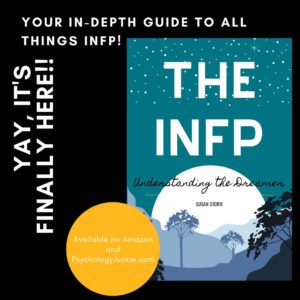
Different Values
ETJs are often very focused on being successful and constantly increasing their competence. They are take-charge people who believe in making the most of life and getting to the top. INFPs, in contrast, are often focused on personal expression and forming meaningful connections, whether it’s through creative works or working with people one-on-one. INFPs can sometimes feel that ETJs focus too much on their careers and professional lives, while ETJs can feel that INFPs are too idealistic and controlled by their changing feelings.
How to resolve this problem:
– Respect your partner’s goals in life, even if they are far different from your own. Respect their strengths and how they use them in their daily life. For ETJs it means admiring the INFPs talent for understanding the human condition and holding to their values no matter what. For INFPs it means admiring the ETJs talent for business, accomplishing goals, or taking on big projects. Obviously, there are numerous other unique abilities that your partner probably has that I’m not mentioning here because it will vary from person to person.
– Try to show an interest in each other’s projects and interests, even if they may not match your own. This is an important way to show them that you value their abilities and that you care.
Different Energy Needs
ETJs are invigorated by being around other people. They like to surround themselves with friends or co-workers on a regular basis to talk things over or work on a project. They like to be active in many ways, and they also like delegating. This can seem controlling to the INFP, who needs more alone time and space to process and reflect. If they spend too much time socializing they will feel drained, whereas if the ETJ spends too much time alone they will feel drained.
How to resolve this problem:
– Respect each other’s differing needs. ETJs need to know that socializing will gradually drain the INFP, and the INFP needs to know that too much solitude will drain the ETJ. Give each other space and permission to meet their own energy needs without judgment.
– ETJs try not to get too busy delegating to the INFP. They can get irritated with this and feel like they are being “bossed around” too much. Ask them if they’re available and interested before giving them something to do.
Different Outward Decision-Making Styles
ETJs like to make decisions quickly and move from one project to the next. They don’t like to mull over things for very long and strive for efficiency in all their actions. INFPs, in contrast, like to take their time before making a decision. They want to consider all the different angles and let the idea simmer for a while before moving forward. They can feel overwhelmed when they are being pushed for a decision or an answer before they are ready. The ETJ can feel frustrated when they are left hanging and feel a need for closure on a decision. This can be a great source of frustration for both of them.
How to resolve this problem:
– This is an area where both partners need to find some middle ground. INFPs can try to be a little more decisive and direct, getting some time to think things over, but not an excessive amount. ETJs, in turn, can try to give them more time to think things through and reflect on decisions. This only works if both partners are trying to make an effort; if only one partner is, then this can breed resentment and a feeling of being pushed into an uncomfortable place. It’s also not fair.
The Sensing/Intuitive Difference in ESTJs and INFPs

This won’t be an issue for ENTJs with INFPs, but it can be for ESTJs with INFPs. ESTJs like to focus very much on the practical matters of daily life. They are focused on current realities and when they think about the future, it is usually because they are coming up with practical plans. They speak in a literal way and focus on what is real, what has happened before, and what is the tried and true technique. INFPs are more focused on possibilities for the future and love to discuss theoretical, abstract ideas. ESTJs are very matter-of-fact and can get frustrated with the complexity and other-worldly nature of the INFPs interests and imaginative ideas. They can both reach a conversational roadblock when the ESTJ only wants to focus on sensing topics and the INFP only wants to focus on intuitive/theoretical “what if” topics.
This isn’t to say that ESTJs can never enjoy theoretical discussions or that INFPs are never practical. It only means that they prefer on a day-to-day basis to immerse themselves in either the sensing or intuitive world.
How to resolve this problem:
– Both partners should try to truly listen to each other and be aware of their different needs. This is, again, an area where they need to find some middle ground. The ESTJ can admire and appreciate the INFPs imaginative mind and complex ideas and insights into the future. The INFP can admire the ESTJs ability to take care of present realities and to be down-to-earth and practical. Remember that it is probably some of your differences that attracted you to each other in the first place.
– ESTJs can sometimes find the intuitive forecasts and insights of the INFP hard to trust. Because ESTJs like to have all their ideas planted firmly in “reality” and what they can trust through personal experience, they may find intuitive insights difficult to take seriously. It’s important for the ESTJ to remember that this intuitive insight is the INFPs skill and to try to trust it without seeming condescending or dismissing it because it doesn’t match up with their sensing way of viewing the world.
– In contrast, the INFP needs to work to admire what the ESTJ has gathered from personal experience and their memory for facts and details. This is the ESTJs strength, and so you can trust that they are often going to be very accurate with their ability to remember how things have worked before and how to take care of practical daily needs.
– For the INFP, when you need help gathering data before making a decision, turn to the ESTJ because this is their strength. For the ESTJ, when you need help focusing on the “big picture” or dealing with the feelings of others, ask the INFP for help. This is their strength.
What Do You Think?
Was this post helpful? Do you have any of your own experiences to share? Let me know in the comments!
Find out more about your personality type in our eBooks, Discovering You: Unlocking the Power of Personality Type, The INFJ – Understanding the Mystic, and The INFP – Understanding the Dreamer. You can also connect with me via Facebook, Instagram, or Twitter!
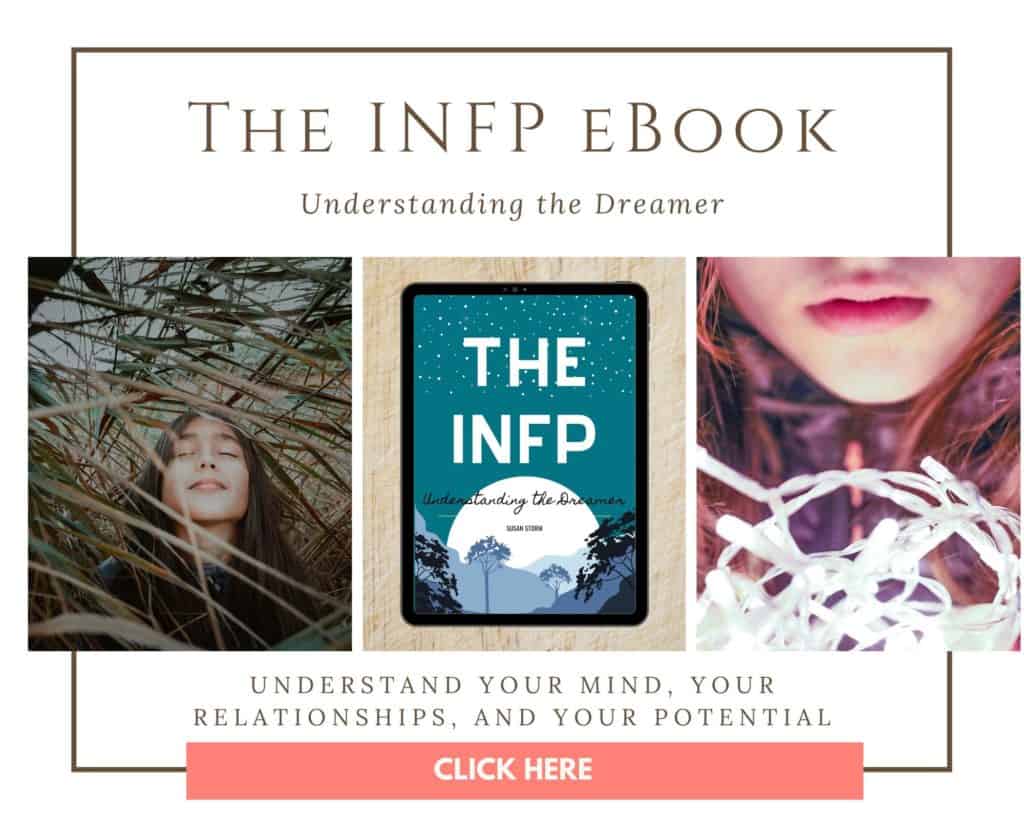

Subscribe to Our Newsletter

Want to discover more about personality type? Get the inside scoop with Susan Storm on all things typological, along with special subscriber freebies, and discounts on new eBooks and courses! Join our newsletter today!




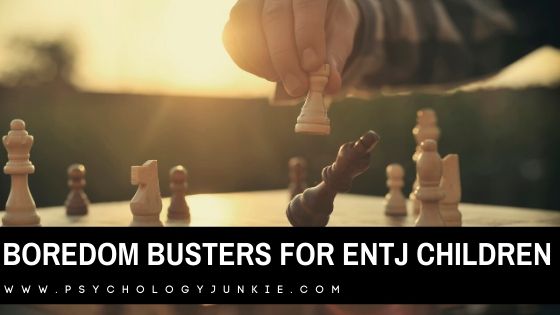
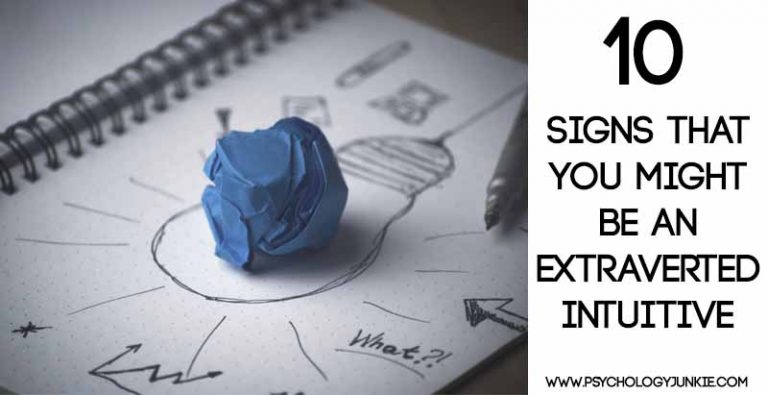
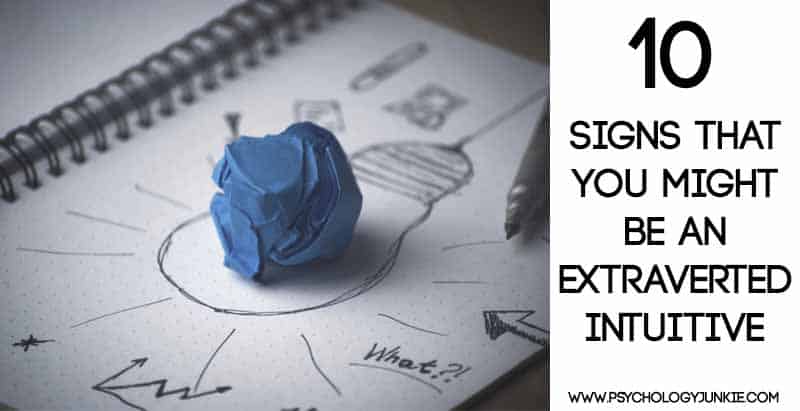




There is implication that INFPs are drawn to ENTJs because of their “intellectual prowess” BECAUSE this is a weak spot for INFPs…. I find that not only untrue but insulting. INFPs are often intellectually inclined, may do quite well academically, be over-represented in high iq and gifted populations, etc. Quite frankly, not all of us are warm either. As an INFP, people say I am kind and patient, but my initial demenaor can be cool and seem stand-offish. What draws people to me is the offbeat, authentic thing, as well as being calm and laid-back. My clash with ESTJs is I may seem too indecisive for them (needing far more time for reflection prior to any decision), my lack of organizational abilities and resistance to structure, and my disinterest in maintaining status quo or conforming to arbitrary rules. I find them to be uptight prigs, frankly. I have interacted far less with ENTJs IRL, as they are way less common and we simply don’t cross paths much. The only problem I have seen thus far is they are the ones who get butthurt easily. They take many things as a challenge or threat wheh it’s simply an alternate perspective or even a joke. This happens with ESTJs sometimes too. I think me being INFP really triggers their sensitivities. It’s funny in that it’s the exact opposite of what these kinds of articles propose the problem will be….I offend them and find myself on eggshells, unable to freely express my thoughts or ideas, because they blow up if anyone disagrees with them.
Preach it! INFP married to an ESTJ. Even though my husband and I are equally intellectual, he is less polished and educated, even when approaching him in the most tactful way he gets defensive about academic, and must challenge me with nonsense. It is exhausting, thanks for Google solving a lot of arguments lol.
Yep totally agree. I’m living it.
ESTJ egos get hurt easily.
Yup. I’ve worked with or dated several ExTJs, and the common thread among many of them is that they act as though they want a yes man or a doormat. I’m aware that these people were likely unhealthy types; quite possibly some had Narcissistic Personality Disorder. But in all cases control was both a religion and a fetish for them. They saw me and thought, “she’s quiet and emotional, therefore she must be submissive and stupid, therefore I can make her dance like a puppet.” Joke was on them: INFPs don’t take kindly to others rejecting their authenticity and strong values.
My husband tests entj, I left him a year ago after I was completely useless after some post partum issues. The love languages he desires the most are word of affirmation and acts of service and then the other three…He started treating me like garbage but I didn’t make it easy on him either. He had to come home from work and pick up all the slack at home while I was an emotional mess. We realized we took each other for granted though and we ‘re in love again. Together 15 years and we have 5 kids. I appreciate that he’s straightforward and doesn’t sugarcoat anything. It’s like honesty on steroids and I admire it. We both put a high value on loyalty too which is something I believe both our types have in common. He’s straightforward about his love toward me and complements me all of the time, he takes his role as a father and husband seriously…I never have to wonder where I stand. He can be a little intense and overwhelming.. He’s so loud and invasive and I’m like a sponge but it works. We’re meant for each other.
Needless to say I’m a believer in infp + entj :).
My husband is an ES lTJ and I am an INFP and in reading this post we felt like we were reading a verbatim description of our relationship!! My number one issue is that he interrupts me and finishes my sentences and we been talking about this for 20 years, it is further exacerbated by his East Coast background and my West Coast origins. I think I frustrate him because I don’t state my feelings and needs clearly. We are planning to laminate this article and keep it in our wallets for future reference!
Hahaha so truee…the same problem here
Hahaha so true, sometimes i wonder what the hell i was thinking when married my ESTJ partner, because many Times he can be so critical, hard and harsh. As an INFP i live on Lala land all day. Thank u for this insightful reading. I cant imagine live without him because he put me on the ground and turn my dreams into reality.
Thank you so much for this. I’m in a new relationship with an ENTJ. I’m INFP. Everything was unbelievably easy in the beginning, now that we’ve moved in together we’ve been clashing like crazy, but not giving up on our love for eachother. This was extremely eye opening and helpful and I can’t wait to share with him what I’ve learned and try to apply some of these things. Also reading the comments and realizing that this unlikely duo really can be successful makes me feel so much better!
I’m an INFP and is dating an ENTJ currently. I found this article is describing what is happening between us. I often found him being too critical and judgmental. There were times I’ll just get hurt by his blunt comments and directness, although I know he meant well and is being honest. I’ll definitely share this with him and try to work on the resolutions together. 🙂 Thank you for the article.
Thanks for this article! I am an INFP and my best guy friend is an ENTJ. I am not in a romantic relationship with him and it’s not my desire/intention to be, but reading this has given me some helpful insight to his mind and who he is, even if we are just friends. I will definitely be referencing back to this from time to time to read and hopefully even understand more than I do now as the friendship progresses. Again, thank you ❤️
That’s wonderful!! I’m so glad this article helped! I definitely think any of these tips can help friendships succeed better too 🙂 I wish you all the best in your friendship!!
This article may save my husband & I both time & money as opposed too marriage counseling!! LOL! I’m a ENTJ, my husband is INFP. This article hit all of our strengths & weaknesses spot on. Thank you for the tips with his to deal with them. We’ve been together 14 years, married 10. Both feel under appreciated at times, misunderstood at other times. A friend suggested we get to know our Myers-Briggs personalities in order to grow. We’ve been on this quest all year and its been both fun & rewarding. Now, we laugh at each other and our differences knowing that its because of our types. Thank you so much for this article! You’ve given us more to discuss 🙂
Wow just seems so spot on. I’m super amazed how accurate this really is. Thanks for the info it really has helped me to see things far more clearly than I have been. I know my infp self is for sure intimidated by his entj self. I thought I was secure within myself until our first encounter. He had triggered me in ways I just was comprehending. Now it all makes better sense to me. Thanks again for this info ♡♡♡.
Heidi
Hi Heidi!
I’m so glad this article was helpful to you! I hope your relationship works out and you feel confident in your amazing abilities and strengths as an INFP 🙂 There certainly is a lot of potential in this pairing!
My husband is an INFP and I’m considered ENFJ. I say considered because as much as I literally hit every mark – I can’t help but think I’m potentially casting myself into a role to identify with an established personality. Anyway, our marriage can relate to this article! I’ve actually sent this to him (knowing he won’t read it, I’ve also read it to him). It’s funny how you assume your problems are unique in regards to circumstances, but in reality it’s the personality that determines the problems and how the circumstances are perceived! I’m enlightened. Thank you.
I’ve very quick and direct in everything I do.. i.e. my motions, my demeanor, my language and delivery. In contrast, he is very sloooowwww in story telling, talking, getting the point across, making the story relevant to the situation. It drives me bonkers – I’ve already fixed, changed and moved onto the next situation by the time he’s assessed the first. Also being diagnosed with extreme ADHD, it’s funny how I’ve managed a relationship with someone so far on the opposite end of the scale.(That’s a kudos to him. I’ve maintained my end, he’s been patient, loyal and loving on his. Bless his heart.)
We celebrated our ten year wedding anniversary this month and it’s a daily struggle that is worth every second. To assume these personalities are incompatible is common, yet people have a tendency to forget that though INFP’s are strong in their beliefs and values – they value their feelings and idealistic views. Sometimes that’s what it takes to develop enough patience for us ENTJs. 🙂